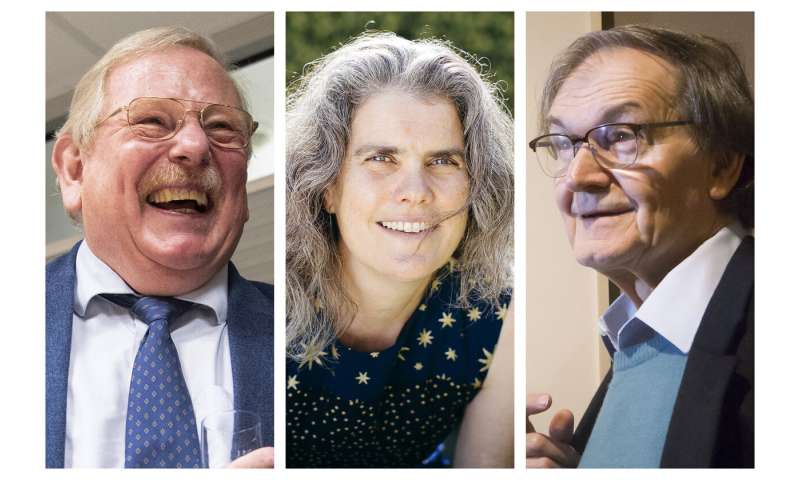https://phys.org/news/2020-10-scientists-nobel-physics-prize-cosmology.html
3 scientists win Nobel physics prize for black hole research
by David Keyton, Seth Borenstein and Frank Jordans

This combination of 2020 and 2015 photos shows, from left, Reinhard Genzel, astrophysicist at the Max Planck Institute for Extraterrestrial Physics; Andrea Ghez, professor of physics and astronomy at UCLA, and Roger Penrose, of the University of Oxford. On Tuesday, Oct. 6, 2020, they shared the Nobel Prize in Physics for advancing our understanding of black holes. (Matthias Balk/dpa, Elena Zhukova/UCLA, Danny Lawson/PA via AP)
Three scientists won the Nobel Prize in physics Tuesday for advancing our understanding of black holes, the all-consuming monsters that lurk in the darkest parts of the universe and still confound astronomers.
Roger Penrose of Britain, Reinhard Genzel of Germany and Andrea Ghez of the United States explained to the world these dead ends of the cosmos that devour light and even time. Staples of both science fact and fiction, black holes are still not completely understood but are deeply connected, somehow, to the creation of galaxies, where the stars and life exist.
Penrose, of the University of Oxford, received half of the prize for discovering that Albert Einstein's general theory of relativity predicts the formation of black holes.
Genzel, who is at both the Max Planck Institute in Germany and the University of California, Berkeley, and Ghez, of the University of California, Los Angeles, received the other half of the prize for discovering a supermassive black hole at the center of our galaxy.
The prize celebrates what the Nobel Committee called "one of the most exotic objects in the universe" and ones that "still pose many questions that beg for answers and motivate future research."
Black holes are at the center of every galaxy, and smaller ones are dotted around the universe. Just their existence is mind-bending, taking what people experience every day on Earth—light and time—and warping them in such a way that seems unreal. Time slows and even stops in black holes.
more at link.....................
3 scientists win Nobel physics prize for black hole research
by David Keyton, Seth Borenstein and Frank Jordans

This combination of 2020 and 2015 photos shows, from left, Reinhard Genzel, astrophysicist at the Max Planck Institute for Extraterrestrial Physics; Andrea Ghez, professor of physics and astronomy at UCLA, and Roger Penrose, of the University of Oxford. On Tuesday, Oct. 6, 2020, they shared the Nobel Prize in Physics for advancing our understanding of black holes. (Matthias Balk/dpa, Elena Zhukova/UCLA, Danny Lawson/PA via AP)
Three scientists won the Nobel Prize in physics Tuesday for advancing our understanding of black holes, the all-consuming monsters that lurk in the darkest parts of the universe and still confound astronomers.
Roger Penrose of Britain, Reinhard Genzel of Germany and Andrea Ghez of the United States explained to the world these dead ends of the cosmos that devour light and even time. Staples of both science fact and fiction, black holes are still not completely understood but are deeply connected, somehow, to the creation of galaxies, where the stars and life exist.
Penrose, of the University of Oxford, received half of the prize for discovering that Albert Einstein's general theory of relativity predicts the formation of black holes.
Genzel, who is at both the Max Planck Institute in Germany and the University of California, Berkeley, and Ghez, of the University of California, Los Angeles, received the other half of the prize for discovering a supermassive black hole at the center of our galaxy.
The prize celebrates what the Nobel Committee called "one of the most exotic objects in the universe" and ones that "still pose many questions that beg for answers and motivate future research."
Black holes are at the center of every galaxy, and smaller ones are dotted around the universe. Just their existence is mind-bending, taking what people experience every day on Earth—light and time—and warping them in such a way that seems unreal. Time slows and even stops in black holes.
more at link.....................
